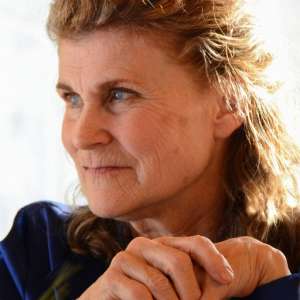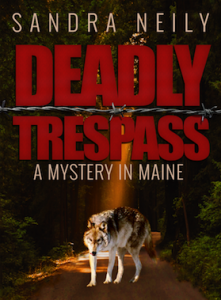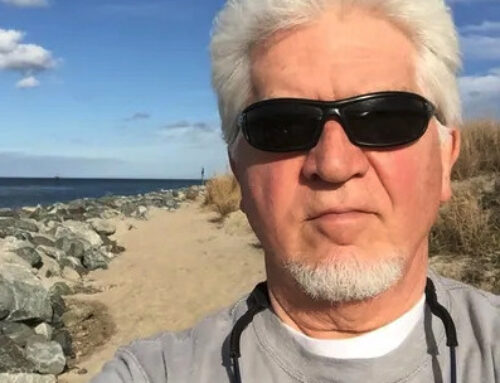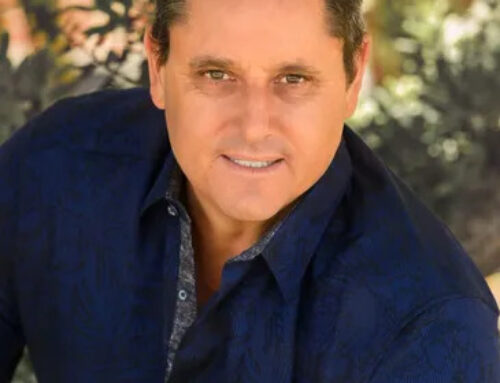 I’ve been chased by moose, river otters, and mad mother partridges. And that’s recent. My seriously unsupervised childhood exploring clam flats, deep forests, and secret streams grew into the marrow that became my novel, Deadly Trespass.
I’ve been chased by moose, river otters, and mad mother partridges. And that’s recent. My seriously unsupervised childhood exploring clam flats, deep forests, and secret streams grew into the marrow that became my novel, Deadly Trespass.
I’ve worked to infuse my mystery-thriller with the drama and laughter of various outdoor careers, the sadness of loss, and close encounters with wildlife and unruly dogs. I live on Moosehead Lake and would rather be fly fishing, skiing, paddling, or just generally “out there” — unless I’m writing new fiction that draws people into a (safe-at-home) field trip to a disappearing world.
Tell us about your book.
Deadly Trespass is a double murder mystery. First it’s a mystery thriller that propels readers across the wildest of Maine’s terrain and into its coldest waters—in search of whispered wolves, possible murderers, odd bedfellows, greedy sons of bitches, and reasons for it all. It’s also a woman’s journey into what rises up to matter when one’s lost it all. And at its thematic core, it’s about the murder of Maine’s north woods…or any last-stand slice of nature.
What tools or companies did you use, and what experience did you have?
In my various careers I’ve written professional non-fiction: grant proposals, web site copy, reports, articles, legislative testimony, and much more. But never fiction, so I read everything Writers Digest offered and took many of their webinars. I used my tax returns and severance checks (lost two jobs during the Big Recession) to attend writers’ conferences.
Attending The Mystery Writers of America Crime Bake conference (Boston) was often overwhelming (so many hopefuls) but very helpful. I entered every contest for unpublished work I could find or afford. I read many excellent “how to” books. (Donald Maass was a favorite.) Jane Friedman’s blog and newsletters are the BEST in the business of self publishing! Through her I found Kwill Books and the opportunity for genuine collaborative self publishing.
What do you think are the main pitfalls for indie writers?
I am grateful that I traveled far along the route of beta-readers, cutting and editing driven by content editors and rejection comments, and the opportunity to cut at least 40,000 words. Everyone needs a compassionate and ruthless editor and pre-readers. I listened to advice when it was echoed by several people and ignored advice that seemed singular and out-of-place. In other words, the discipline that comes with intense revision is necessary for us all and if we can’t get it under the care of a traditional publisher, we should create a rigorous system for ourselves.
What tips can you give other authors looking to self-publish?
I once had a ‘how-to-pitch’ course instructor tell our class that often it’s not even talent that creates success. In her experience as an agent, persistence was most often the deciding success factor. (After “write the best book that you can” of course).

I write best in the early morning and sometimes late at night when I have been tempted to review the day’s work and am carried along. Stephen King is right: just get the words on the page. Any words. I have a word count goal and before leaving the pages, I review them quickly and highlight material I want to touch up the next day.
I create a timeline map (open to change) that plots out story sequences as well as rising and falling action. Before each new chapter, I make a list of everything I think I want to put in, including bits of saved up dialogue and snippets of details I’ve kept in a file called “Slices of Life.” I plan out the unexpected surprises, at least one on each page, even if it’s just water spilled on creased pants. But when I find characters or a scene pulling me in a direction I didn’t intend, I just lean back and let it rip.
Tell us about the genre you wrote in, and why you chose to write this sort of book.
I chose to write a mystery because one day, standing in the middle of a completely cut and destroyed forest, I asked myself a question. Why was it such a mystery that people destroyed the very resources necessary for life? It came to me that most people had never seen a healthy forest or a destroyed one, so I decided to work my mystery question into an entertaining and compelling mystery that might take them (warm and safe at home) into a threatened world.
Who are your biggest writing inspirations and why?
I adore authors Louise Penny and Elizabeth George for their smart, many layered mysteries deeply grounded in settings that have lives of their own. Nevada Barr takes us deep into uncomfortable outdoor places most of us won’t go and I love her for it. I read Lee Child to remind myself that it’s really all about character, character, character. That’s Reacher. I read Nora Ephron to hear what a deeply personal and real Voice sounds like. When I drive, I listen to books on tape and replay some chapters over and over until I can almost see the author selecting each word. I try to hear Charlotte Bronte’s “Jane Eyre” once a year.
So many inspirations and they come in all sizes and shapes. A few months into writing I started feeling that books I read, movies and TV I watched, even art on the wall, were all telling me things I needed to hear. Needed to learn. So I’ve kept a journal where I record the lessons. To Kill a Mockingbird has not one wasted word. Not one. Every word has an inspired role in character and plot. And that we already know most everything we need to know about Scout after her first words and certainly after the first chapter. That as Stephen King says, it’s details, details, details. We know about Jack Reacher’s world from the fold-up toothbrush he keeps in his pocket as his only possession. And so on….
What did you learn on your journey as an author?
I learned it’s a never-ending learning journey, that I should just treat it like giving myself an MFA or another advanced degree. But at the same time I was a sponge soaking up craft expertise, I had to learn to find my own voice and trust it. That’s sounds vague, but one day I reread my work, heard it, knew it, and cut what was artificial.
What are your plans now your book is published?
I am currently writing the second Mystery In Maine novel. In “Deadly Turn” Patton collects dead bats and eagles at wind power sites, stumbles on pieces of the wind industry’s whistle-blowing economist and is accused of his murder. Befriended by a teenage trapper determined to sabotage and snare construction crews dynamiting his mountain into towers and turbines, Patton is — once again — offered only outlaw solutions to fight for the wild world.
Links
Author Site
Twitter
Amazon
Goodreads
Get an Editorial Review | Get Amazon Sales & Reviews | Get Edited | Publish Your Book | Enter the SPR Book Awards | Other Marketing Services






















Leave A Comment